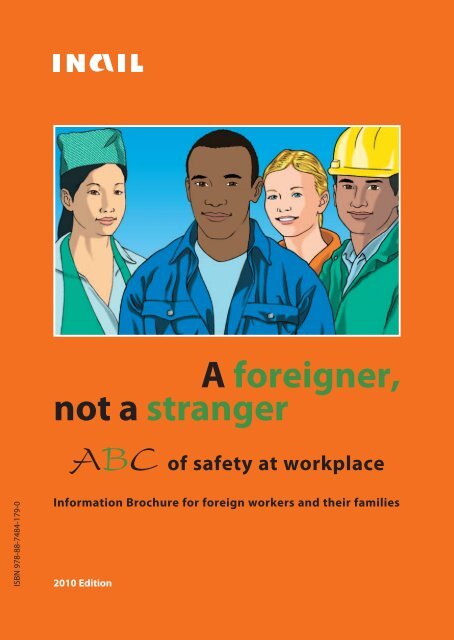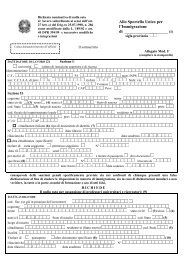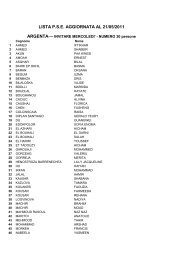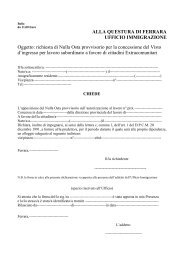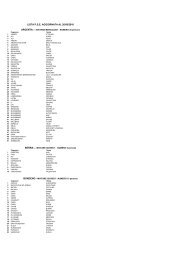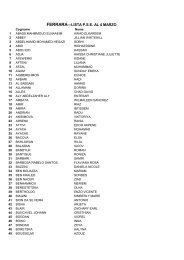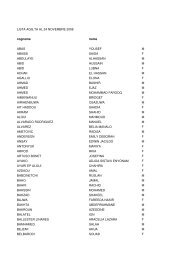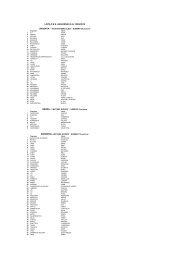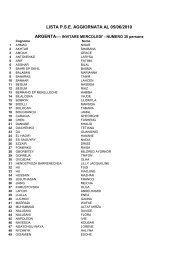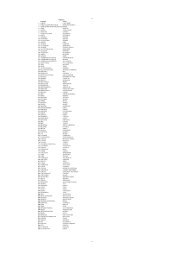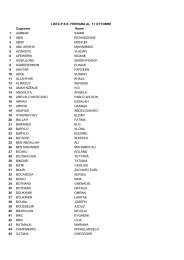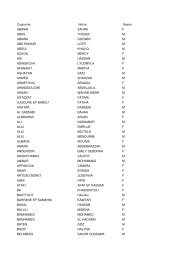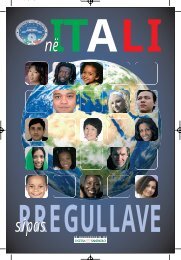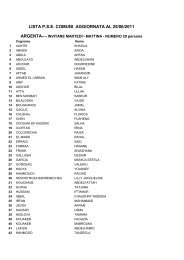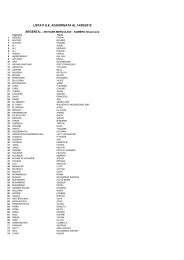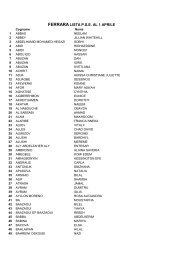A foreigner, not a stranger - Inail
A foreigner, not a stranger - Inail
A foreigner, not a stranger - Inail
You also want an ePaper? Increase the reach of your titles
YUMPU automatically turns print PDFs into web optimized ePapers that Google loves.
A <strong>foreigner</strong>,<br />
<strong>not</strong> a <strong>stranger</strong><br />
ABC of safety at workplace<br />
ISBN 978-88-7484-179-0<br />
Information Brochure for foreign workers and their families<br />
2010 Edition
Prepared by<br />
Directorate of Communication<br />
Illustrations: Dario Tucci<br />
Translated by: Stephen Ogongo Ongong’a<br />
for Stranieri in Italia Editore srl<br />
www.stranieriinitalia.it<br />
INAIL - Direzione Centrale Comunicazione<br />
Piazzale Giulio Pastore, 6 - 00144 Roma<br />
dccomunicazione@inail.it<br />
www.inail.it<br />
Copyright © INAIL - 2010 Edition<br />
Distributed free of charge. Not for sale.<br />
ISBN 978-88-7484-179-0<br />
Printed by Tipolitografia INAIL - Milan - May 2010
INAIL - The National institute for work injury and occupational<br />
illness insurance - has the objectives of reducing injuries,<br />
protecting workers performing hazardous jobs and facilitating<br />
the reintegration to work of those injured at workplace.<br />
The protection comprises of an integrated system, ranging from preventive<br />
actions at the workplace to medical services and financial assistance;<br />
to rehabilitation and reintegration of victims of workplace accidents or<br />
professional diseases to social life and work.<br />
Prevention and implementation of safety standards are key to reducing<br />
workplace accidents.
This brochure will help you understand<br />
what it means to work in<br />
safe conditions<br />
While working, you have a duty:<br />
<strong>not</strong> to harm yourself.<br />
There are jobs which are more dangerous<br />
than others; they therefore<br />
require more attention on your part<br />
to prevent accidents and professional<br />
diseases.<br />
PREVENTION IS BETTER THAN RISKING!<br />
This is why you must have appropriate behaviour to save your body and<br />
life!<br />
We’ll show you the safe behaviours to adopt to avoid harming yourself<br />
and others while at work because your health is precious <strong>not</strong> only to you<br />
but also to your family.<br />
We’ll also show you your rights as a worker regarding safety at workplace.<br />
We’ll inform you of what you must do if you hurt yourself while working, if<br />
an accident happens to you, or if you fall sick because of work.<br />
Every year, migrant workers are victims of many workplace accidents.<br />
It is therefore important to know that the law helps you to protect your<br />
health while at work.<br />
In this regard, your employer has clear duties and responsibilities<br />
towards you.<br />
You must know them: they’ll be helpful to you in knowing what to<br />
ask for.<br />
5
SAFETY<br />
Safety at workplace<br />
What does safety at work mean?<br />
It means preventing and reducing the risks of accidents and diseases<br />
caused by work.<br />
In Italy there are laws indicating rules and behaviours for making the workplace<br />
safer: any possibility of eliminating risks should be facilitated and<br />
<strong>not</strong> hindered.<br />
This is why your attention and your collaboration are necessary in addition<br />
to your employer’s responsibilities and protection from INAIL<br />
which you can contact in order to obtain further information and clarify<br />
any doubts you may have.<br />
6
What is INAIL?<br />
The National institute for work injury and occupational illness insurance<br />
INAIL is the public body that assures and protects you if you are injured<br />
or contracts a disease because of work.<br />
The employer must pay the INAIL insurance premiums.<br />
This is a public and compulsory insurance: The State in fact obliges<br />
the employer to insure you if you carry out paid work using dangerous<br />
machines, tools, and equipment of any kind.<br />
INAIL, in any case guarantees your protection even if the employer has <strong>not</strong><br />
paid the insurance premiums.<br />
YOUR RIGHTS AND YOUR RESPONSIBILITIES<br />
THE RISK: IF YOU KNOW IT, YOU AVOID IT<br />
According to the law, you have a right to:<br />
• be informed by your employer or your direct superior of the specific<br />
risks of your work and also of the risks of your work environment;<br />
Safety<br />
is important<br />
• ask your employer to provide<br />
training courses to help you<br />
better understand what are the<br />
risks and how to carry out your<br />
work safely;<br />
7
• have tools that protect you from<br />
the dangers which can<strong>not</strong> be<br />
eliminated. Your employer must<br />
provide the tools. They are called<br />
Personal Protective Equipment<br />
(DPI);<br />
... and these are<br />
some of the<br />
Personal Protective<br />
Equipments<br />
(DPI)<br />
• know the Head of Prevention<br />
and Protection Service (RSPP).<br />
This service consists of means<br />
and people in charge of prevention<br />
and protection from risks;<br />
• know and contact the Head of Prevention and Protection Service<br />
(RLS) who collaborates directly with the prevention services;<br />
I’m the Head of<br />
Prevention and<br />
Protection Service<br />
(RSPP)<br />
… and I’m the<br />
worker’s<br />
Representative for<br />
Safety<br />
(RLS)<br />
• know the names of people in<br />
charge of first aid and emergency<br />
services in order to know<br />
who to contact in case of emergency;<br />
8
• know who is the competent<br />
doctor in charge of and including<br />
health surveillance on workers,<br />
who also carries out periodic<br />
checks on health status;<br />
• know the first aid, fire extinguishing<br />
and evacuation procedures.<br />
Your duties towards yourself<br />
and others:<br />
Your first duty is to take care of<br />
yourself: never forget the importance<br />
of safety at workplace. Don’t<br />
have risky behaviours: this will<br />
also help your colleagues <strong>not</strong> to<br />
have such behaviours. Your safety<br />
is also safety of others. You can<br />
all together create a safe work<br />
environment.<br />
9
Your obligations:<br />
g<br />
use all Personal Protective Equipment (DPI):<br />
• unmodified<br />
• follow the instructions<br />
• ensure you always use the ones assigned to you;<br />
• undergo training for their proper use;<br />
g<br />
g<br />
g<br />
put into practice the instructions you are given by the employer<br />
about safety measures and danger warnings;<br />
contribute together with the employer and staff in charge of safety to<br />
the respect of rules that safeguard safety and health;<br />
report immediately any defects on Personal Protective Equipment<br />
(DPI);<br />
g<br />
do <strong>not</strong>, out of personal initiative,<br />
carry out any operations<br />
or manoeuvres which are <strong>not</strong><br />
your duties, or which may compromise<br />
your safety and that of<br />
your colleagues.<br />
DUTIES OF YOUR EMPLOYER<br />
In order to guarantee your safety at workplace, your employer must<br />
mainly:<br />
• in collaboration with the Head of Prevention and Protection Service and<br />
competent doctor, carry out risk assessment (VdR) related to the type<br />
of work and risks which can<strong>not</strong> be avoided;<br />
10
• put into place all the measures necessary for preventing accidents and<br />
or professional diseases and carry out periodic check and maintenance.<br />
The employer must:<br />
- supply all Personal Protective Equipment (DPI) which vary depending<br />
on the work carried out: gloves, shoes and safety belts, eye protection,<br />
noise cancelling headphones, helmets, aprons, masks, phosphorescent<br />
clothing and others, to protect you against risks which<br />
threaten your health and your safety;<br />
- ensure appropriate use of work equipment (*) by respecting safety<br />
standards;<br />
- provide adequate training for use of work equipment and tools which<br />
require special knowledge as a special condition for their use;<br />
• expose all safety signs necessary<br />
to avoid risks and limit avoidable<br />
risks;<br />
• carry out health surveillance<br />
of workers and respect hygienic<br />
measures .<br />
I’ve checked the<br />
scaffolding: they<br />
meet the required<br />
standards!<br />
* Work equipment is any machine, tool or<br />
appliance that must be used during and<br />
for work.<br />
You can verify if these and other safety measures are <strong>not</strong><br />
applied correctly by contacting the Head of Prevention and<br />
Protection Service RLS<br />
11
THE SHAPE AND<br />
SAFETY COLOURS<br />
SIGNS are important at the workplace.<br />
THE SHAPE AND COLOUR OF SIGNS are elements used to immediately<br />
warn you of a danger, to indicate prohibition, obligation or provide you<br />
essential information.<br />
Always ask for the meaning of a <strong>not</strong>ice, sign or symbol you do <strong>not</strong> know.<br />
The shape and colours of signs vary depending on their message:<br />
• prohibition signs are always in red;<br />
• signs indicating the required behaviour you must adopt are always in<br />
blue;<br />
• warning or attention signs are in yellow or yellow-orange;<br />
• signs of rescue or relief showing exits, materials, and routes are in<br />
green;<br />
• fire signs indicating where the fire extinguishing equipment are, are in<br />
white and red;<br />
• the hand signals indicate the moves to make.<br />
12
SAFETY SIGNS<br />
13
Here are some of the signs you’ll meet often:<br />
No Entry to Unauthorized<br />
Personnel<br />
No forklift trucks<br />
Do <strong>not</strong> touch<br />
Not drinkable water<br />
No smoking or open flame<br />
Do <strong>not</strong> extinguish with<br />
water<br />
Attention: Biological risk<br />
Risk of falling<br />
Overhead load<br />
Corrosive substance<br />
Fire extinguisher<br />
Fire hose reel<br />
Direction to follow<br />
Fire telephone<br />
14
Safety gloves must be worn<br />
Safety helmet must be worn<br />
Safety boots must be worn<br />
Safety belt must be worn<br />
Safety overalls must be worn<br />
Eye protection must be worn<br />
First aid<br />
Stretcher<br />
Emergency eyewash<br />
Emergency shower<br />
Emergency exit signs<br />
15
What happens if you are injured?<br />
You can become a victim of workplace accident, that is, you can be<br />
injured while working, or while on your normal route to the workplace or<br />
on your way home (accident on the way).<br />
Therefore, there are things you must absolutely do, even if you’ve been<br />
slightly injured:<br />
• immediately inform or let your employer be informed;<br />
• go immediately to the Emergency Department (Pronto Soccorso) or<br />
to your GP and declare that you’ve been injured while working and<br />
narrate exactly how and where it happened.<br />
You must be informed that these declarations are fundamental for<br />
you to receive all the assistance you need from INAIL even if you don’t<br />
have a regular work contract!<br />
It’s <strong>not</strong> an accusation, it is a request for protection.<br />
The Pronto Soccorso or your GP must issue you the first medical certificate<br />
showing the diagnosis and foreseen days of absence from work;<br />
• send to your employer as soon as possible, a copy of the medical<br />
certificate and keep a copy for yourself (photocopies of the certificate<br />
are <strong>not</strong> valid). If you are hospitalized, the hospital will have the duty<br />
of sending a copy of the medical certificate to your employer and to<br />
INAIL;<br />
• if the medical certificate expires before you’ve recovered, you can either<br />
contact the clinic of INAIL nearest to your residence or your GP for<br />
a<strong>not</strong>her medical certificate.<br />
If you can’t work for more than three days, your employer is obliged to<br />
make a report of the accident with a copy of the medical certificate to<br />
INAIL, within two days from the date it is issued.<br />
Check to ensure that he does so, it is for your interest. And if he<br />
doesn’t do so, please do it yourself!<br />
MEDICAL<br />
CERTIFICATE<br />
WORKPLACE<br />
16
Professional disease<br />
Many diseases can be caused by work carried out.<br />
INAIL protects you also in such cases.<br />
It is the duty of your GP to ascertain the disease by issuing you a<br />
certificate.<br />
If you are still doing the same work which has caused your disease, you<br />
must send the certificate to your employer within 15 days, and in case you<br />
are undergoing treatment, you must also send to the employer subsequent<br />
certificates.<br />
If you are no longer doing that work, you can directly submit to INAIL<br />
the application for recognition of that professional disease.<br />
17
INAIL on your side<br />
Benefits<br />
If you are injured at workplace or contract a disease because of<br />
your work, you have a right to be protected by INAIL by receiving<br />
financial and medical support.<br />
You have a right to this protection even if your employer<br />
didn’t pay the insurance premiums, on the basis of the<br />
principle of automatic entitlement to benefits.<br />
There are financial and medical benefits.<br />
They are very important because you can have:<br />
• a daily sum of money if you don’t recover within the first three days (it<br />
is a financial support also known as temporary incapacity benefit):<br />
- equivalent to 100% of your pay for the day the accident occurs, which<br />
you must be paid by your employer;<br />
- equivalent to 60% of your pay for the next three days, which you must<br />
be paid by your employer;<br />
- of 60% of your pay from the 4 th to the 90 th day which is paid by INAIL;<br />
- of 75% of your pay from the 91 st day up to the day you’ve clinically<br />
recovered, which is paid by INAIL unless you have better contractual<br />
conditions.<br />
• free medical treatment from the National Health Scheme at the clinics<br />
and Emergency Department (medical services);<br />
• free specialist medical care at<br />
the specialist medical institutions<br />
belonging to the National Health<br />
Scheme and at legal medical<br />
centres at the branches of INAIL<br />
(medical services).<br />
In order to receive support from<br />
INAIL, you must submit application<br />
within 3 years from the date<br />
of the accident or the time the<br />
professional disease emerges.<br />
18
To prepare the application, you can seek the help of Benevolent<br />
Institutions (Patronati) who according to the law, safeguard your rights<br />
for free.<br />
Each branch of INAIL can provide you<br />
all the necessary information for the damages caused by an accident or a<br />
professional disease, even in case you lose a limb making it necessary for<br />
you to go for prosthesis and rehabilitation treatment in order for you to<br />
resume your daily activities (these are also considered medical services).<br />
In the integrated protection system of INAIL, there are highly specialized<br />
institutions for rehabilitation and re-integration back to work:<br />
• INAIL’s Prosthesis Centre in Vigorso di Budrio - Bologna, with a branch<br />
in Rome, at the Casa di Cura “Villa Sacra Famiglia”;<br />
• Motorial Rehabilitation Centre in Volterra.<br />
In case of deadly accident<br />
Also in case the worker is a victim of an accident in which he loses his life,<br />
there are financial benefits for the survivors and a cheque for the funeral<br />
expenses.<br />
The family, even if they are out of Italy, will be supported by INAIL who<br />
will be giving a monthly allowance to the survivors.<br />
In order to receive support from INAIL, the family members must immediately<br />
submit the application.<br />
19
SHORT QUESTIONS<br />
21
• What happens if you work but your employer has <strong>not</strong> regularised your<br />
status and you get injured or contract a professional disease?<br />
- You all the same have a right to all benefits from INAIL.<br />
• In case of an accident, what do you do?<br />
- Immediately inform your employer and send him the medical certificate.<br />
If you are absent from work for more than three days, your employer must<br />
send the medical certificate to INAIL within two days of receiving it, together<br />
with the report of the accident.<br />
• After going to the Emergency Department, must you go to your GP or<br />
INAIL?<br />
- you can go wherever you want. INAIL has clinics in its branches where all<br />
workers who are victims of accident have a right to receive medical care. But<br />
if you want, you can also go to your personal doctor.<br />
• If you are hospitalised, how do you <strong>not</strong>ify about the accident?<br />
- In this case it is the hospital to directly send a copy of the medical certificates<br />
to INAIL and to your employer. You must in any case inform your<br />
employer.<br />
• What is temporary incapacity benefit?<br />
- It is a financial benefit you are paid to compensate for the missed salary.<br />
- You have a right to it if you are injured (you are a victim of accident) or if you<br />
contract a disease because of your work (professional disease) and you are<br />
unable to work for more than three days.<br />
- It begins from the 4 th day after the accident or emergence of the professional<br />
disease.<br />
- You receive it throughout the period of your temporary incapacity to work,<br />
including holidays, until you recover. The recovery will be ascertained by<br />
doctors from INAIL.<br />
• In case of a professional disease, what do you do?<br />
- Within 15 days from the moment your doctor certifies the professional<br />
disease, you must inform your employer. Your employer, within 5 days of<br />
receiving the medical certificate, must send it to INAIL together with the<br />
report of the professional disease.<br />
• Who is entitled to prosthesis and medical care?<br />
- Any worker who has been disabled after a serious accident at workplace.<br />
22
TELEPHONE<br />
DIRECTORY<br />
TELEPHONE<br />
DIRECTORY<br />
Toll free number<br />
803.164<br />
WHERE IS INAIL?<br />
23
INAIL has offices throughout the national territory<br />
Look for INAIL’s branch nearest to you, you’ll receive all the<br />
information you need.<br />
‘S<br />
BRANCHES<br />
You can contact :<br />
using toll free number 803.164<br />
- from Monday to Friday, from 8.00 to 20.00<br />
- on Saturday from 8.00 to14.00<br />
- Automatic service is on 24 hours a day, including weekends<br />
- The information is provided in 7 foreign languages: German, English,<br />
French, Arabic, Polish, Spanish and Russian<br />
The addresses of all INAIL’s branches throughout the national territory are available in the national<br />
telephone directories.<br />
on the website www.inail.it<br />
In this booklet we’ve tried to provide the essential information to you who have been working<br />
in Italy for a short period and don’t know yet our laws, the institutions, Italian language.<br />
Your attention to safe behaviours is of great importance.<br />
At the INAIL’s branches you can obtain news and more detailed information about the issues<br />
handled here.<br />
24


